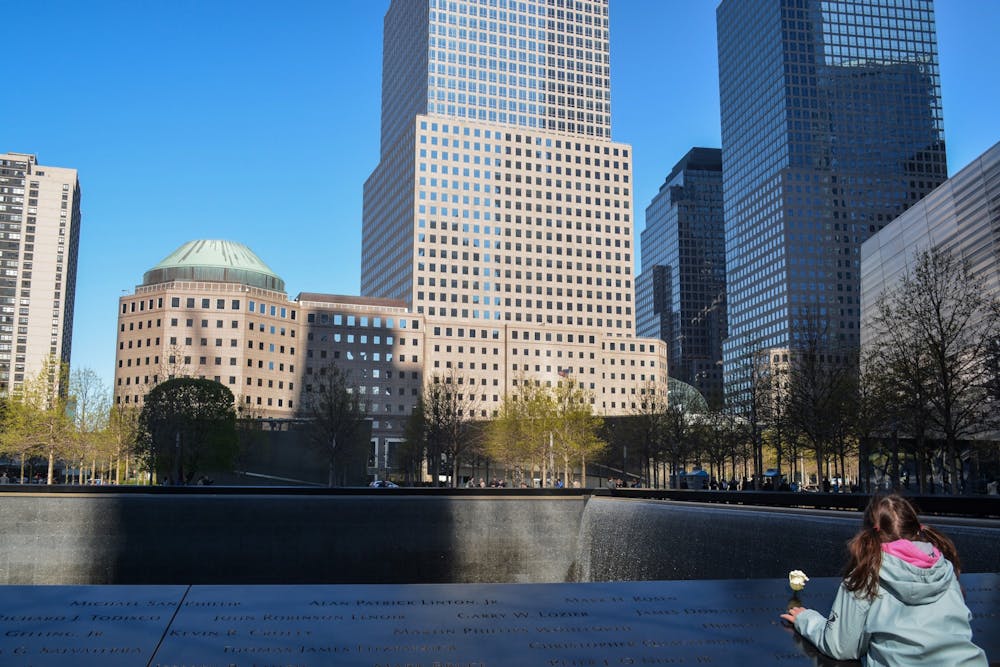On the 20th anniversary of 9/11, many of us come of age with a tragedy that we are unable to personally recall. Like many young people who were either unborn or not old enough to remember the terrorist attacks on September 11th, 2001, I asked my parents where we were during that tragic day.
I was 20 months old living in the suburbs of Las Vegas, Nevada. I woke up my mom around 5:30 a.m. Feeding me a bottle on the couch, she turned on the television and the news was on. The first plane had already struck the World Trade Center. When my mom and I saw the second plane hit the second tower at 6:03 a.m. Pacific Time, she recalled that “her heart sank.” She ran upstairs, holding me on her hip. She woke up my dad, turning on CNN in their room.
My dad said that “they watched a lot of TV that morning.” He remembers planes being grounded within the hour of the attacks. As the head of a timeshare business, he went to work. He recalled having to welcome unexpected plane travelers who were grounded in Vegas on their way to California. “Folks wanted to get home,” so rental cars sold out quickly. Air traffic was at a standstill for weeks. My dad said hotel occupancy plummeted to “almost zero for weeks,” which strained his business.
I share my story because it illustrates my lack of a vivid recollection of 9/11 and the days that followed. Yet I still remember it through others’ stories, images and experiences. I believe that we can all find a fitting way to commemorate 9/11.
There are numerous ways to remember 9/11, from moments of silence to viewing an interactive timeline of how the events unfolded. I would like to suggest a few ways we can honor 9/11 this year and beyond.
First, we can listen to our loved ones about their 9/11 experiences. Where were they? How did they receive the news? How did they react? I acknowledge this can be hard. You can gauge whether this is a sensitive topic for a loved one. I would approach the conversation with honest curiosity to learn more about their life’s experiences. If the opportunity arises, we can also listen to the stories of our professors, our older friends, or our mentors.
Because these conversations can be uncomfortable and challenging, here are some ways to remember 9/11 that anyone can do individually.
If you wonder how Penn students reacted to 9/11, I recommend checking out this photo gallery compiled for 9/11’s tenth anniversary, or reading this alumni recount of how then-reporters for The Daily Pennsylvanian reacted to the news and rushed to New York City to cover the story within days of the attack.
SEE MORE FROM JADEN CLOOBECK:
We can also remember the sixteen Penn alumni that we lost to September 11th, who are commemorated on a plaque located to the west of Van Pelt Library’s main entrance. I recommend visiting that plaque the next time you pass by Locust Walk. We can read about the lives of those people our community lost in order to honor their memories and living descendants.
If you enjoy examining visual artifacts, I suggest checking out the 9/11 Memorial and Museum’s digital collection.
If you enjoy oral histories, you may resonate with this recent engaging NPR Politics Podcast that tells the story of family members and neighbors affected by United Airlines Flight 93, which crashed in southwestern Pennsylvania on September 11th, 2001. You may also enjoy the September 11th Digital Archive’s Voices of 9/11 video testimonials or the 9/11 Memorial & Museum brief audio-recorded oral histories.
9/11 was a tragedy for all humanity, so we are all endowed with the right to remember. We can collectively heal from mass trauma, even if we did not directly experience that trauma. Trauma can reverberate for years, and studies suggest that trauma has the potential to become intergenerational, which is a cautionary tale as we attempt to heal from the mass trauma caused by the COVID-19 pandemic.
Just like 9/11, the next generation — current infants, toddlers and the unborn — will not recall any memories from this pandemic. However, it is imperative that we tell our stories, record them and pass them on to our descendants.
Even though it hurts, we have much to gain by remembering events of mass trauma. By commemorating 9/11 each year, we resist the danger of forgetting to tend to unhealed wounds. Even if we were not directly wounded, we know someone who was. Family members, friends, or first responders. Just as we respect each other by wearing masks during a public health crisis, let’s honor those we lost and those who were wounded – physically, mentally or emotionally – by 9/11.
In my opinion, the best way to honor another person is by giving them your time and attention. In the future, 9/11 will have no living survivors to tell their tales. Yet their memories can live on if we revive their stories every year in commemoration of this day.
The only way to never forget is to remember.
JADEN CLOOBECK is a College senior from Laguna Beach, Calif. studying psychology. His email address is jaden@sas.upenn.edu.









